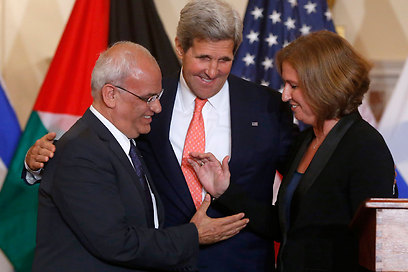
Livni and Erekat
צילום: רויטרס
Report: Israeli, Palestinians negotiators held secret late night meeting
Unconfirmed report claims secret meeting held late Friday night between Livni and Erekat as talks face possible collapse.
Chief Israeli negotiator Tzipi Livni held a secret meeting with her Palestinian counterpart Saeb Erekat late Friday night, the Hezbollah-affiliated Al Mayadeen news site reported.
The report was unconfirmed and came amid speculations that peace talks were reaching an end after a string of tit-for-tat moves by both Israel and the Palestinians seemed to have exhausted US-led peace efforts.
According to the report, the two sides were joined by American envoy to the talks Martin Indyk and met for five hours in an attempt to revive the peace talks.
According to AFP, Israeli and Palestinian negotiators were set to meet jointly Sunday with US envoy Martin Indyk, for the first three-way meeting since Thursday when Indyk met separately with Livni and Erakat after a late night meeting ended in angry exchange of words between the two sides.
A reporter for the Lebanese news outlet Al Mayadeen reported Saturday afternoon that "The two delegations… met last night to address the issue (and formulate) an action plan to revive the peace process… far from the Israeli media."
US Secretary of State John Kerry said on Friday Washington was evaluating whether it was worth continuing its role in Middle East peace talks, signaling his patience with the Israelis and Palestinians was running out.
There was a limit to US efforts if the parties themselves were unwilling to move forward, Kerry said during a visit to Morocco after a week of setbacks.
"This is not an open-ended effort, it never has been. It is reality check time, and we intend to evaluate precisely what the next steps will be," Kerry said, adding he would return to Washington on Friday to consult with the Obama administration.
White House spokesman Josh Earnest acknowledged that President Barack Obama shared Kerry's frustration over "unhelpful" actions by both sides and the two men would discuss the path forward in the eight-month-old talks after the secretary of state's return to Washington.
Kerry's decision to declare a time-out could be an attempt to pressure Israel and the Palestinians to soften their entrenched positions but, should that fail, it might mark the beginning of the end for his signature diplomatic initiative.
By stepping away for now, Kerry is reminding the parties that he can ill-afford to focus endlessly on a fruitless Middle East peace process when other pressing international issues like the crisis in Ukraine demand more of this attention.
Abandoning the peace effort, however, also has its risks. It could deal another blow to Obama's credibility in the Middle East, where he already faces criticism for a tepid response to Syria's civil war and to the military's takeover in Egypt.
"There's tremendous upheaval in the region and internationally right now. Do you want to add to it?" asked Dennis Ross, Obama's former top Middle East adviser. "We don't need to see something we've been investing in collapse."
The current phase of the Middle East peace process is not over, and it has broken down due to "unilateral steps" by both sides, Earnest said.
"It's time for the Israeli leaders and the leaders of the Palestinian people to spend some time considering their options at this point," he told reporters.
The negotiations were catapulted into crisis at the weekend when Israel refused to act on a previously agreed release of Palestinian prisoners unless it had assurances the Palestinians would continue talks beyond an initial end-April deadline.
Kerry flew to Jerusalem to try to find a solution. Just as he believed a convoluted deal was within reach, Palestinian President Mahmoud Abbas signed 15 international treaties, making clear he was ready to beat a unilateral path to world bodies unless he saw more movement from the Israelis.
A senior Palestinian official, Nabil Shaath, told Reuters that Abbas had not intended to upset Kerry, but rather to shine a spotlight on Israel's failure to release the prisoners.
"I think (Kerry) will return because we have not abandoned the process," said the veteran negotiator, speaking in Ramallah, the Palestinians' administrative capital in the West Bank.
"We will continue these negotiations as we agreed, and I wish for once that America's patience runs out - with Israel and not the Palestinians," he said.











